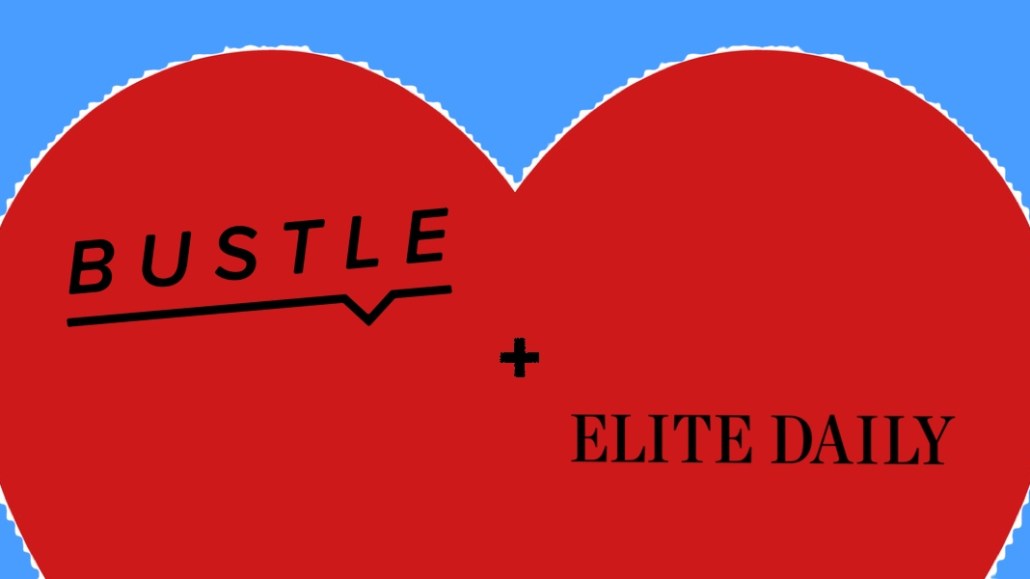Last chance to save on Digiday Publishing Summit passes is February 9
‘They’re putting up big numbers with original video’: Why Bustle bought Elite Daily

Millennial publisher Elite Daily, which soared to profitability in its first year, only to become a write-down late last year, is getting a new lease on life. Women’s interest publisher Bustle announced Monday that it had acquired Elite Daily from the Daily Mail Group Trust, which bought the millennial publisher for $40 million in 2015. The terms of the sale, which involved a mix of cash and stock, were not disclosed.
Elite Daily grew by seizing on Facebook’s power as a content distributor, first for text-based content, then for video. But its risqué posts with titles like “Why semen tastes good” spooked enough advertisers that DMGT had trouble selling Elite Daily’s audience in tandem with Daily Mail’s.
“I thought it was a good match for this company,” said Bustle CEO Bryan Goldberg. “Young people love this brand. The social footprint is massive. Their videos constantly go viral. They have such great recognition amongst young readers, and that’s reflected in the numbers.
Goldberg and Bustle Digital Group’s editor in chief, Kate Ward, both expressed confidence that they can solve for those problems. The two publishers had already been involved in an informal traffic-sharing partnership on Facebook and Instagram, so there’s some familiarity. The conversation has been edited for brevity and clarity.
DMGT kept Elite Daily separate. How will Bustle and Elite Daily share resources?
Goldberg: From a consumer perspective, very little will change. From a sales and back office perspective, there will be full integration. Our sales and marketing team is 100 percent mobilized around this sort of proposition. We’re very experienced at selling native. We’re very experienced at selling custom work for clients.
How are the brands going to work together?
Kate Ward: Elite Daily is really good at humor and picking up on what everyone is talking about right now. Health and wellness. We do health and wellness too, but I think being able to work together on the categories they excel in and we sell in is a really exciting opportunity.
Goldberg: The other thing to highlight is video. Elite Daily has huge viewership. They’re doing tens of millions of views across platforms. One thing I’ve always admired about their success is they’re putting up big numbers with original video. A lot of publishers put up numbers with repurposed third-party footage. This is going to take Bustle’s young daily video team and add a lot of people to it.
One area where Elite Daily really led was sex and dating stuff. You now have three brands [Bustle, Elite Daily and Bustle spinoff, Romper] that focus on sex and dating in some ways. How are you going to blend them?
Ward: Our main goal is to deliver our readers an authentic experience that really speaks to them and what they’re experiencing. For Bustle it was natural to lean into talking about relationships. And with moms too. think the same rings true for Elite Daily. As long as it’s authentic and rings true, I think it’ll translate.
Goldberg: For decades, Cosmopolitan and Seventeen drove the conversations about relationships for young women. And I think for the new generation, Elite Daily jumps to mind. I think that’s just shows how much things have changed in the digital age.
More in Future of TV

Future of TV Briefing: How AI agents prime TV advertising for ‘premium automation’
This week’s Future of TV Briefing looks at how agentic AI can enable TV networks to automate the sales of complex linear TV ad packages.

Inside NBCUniversal’s test to use AI agents to sell ads against a live NFL game
NBCUniversal’s Ryan McConville joined the Digiday Podcast to break down the mechanics of the company’s first-of-its-kind agentic AI ad sales test.

Inside NBCU’s $3 million Peacock Super Bowl pitch
February’s Big Game carries a big price tag for streaming inventory, and buyer need to double down. Still, it hasn’t put marketers off investing.





